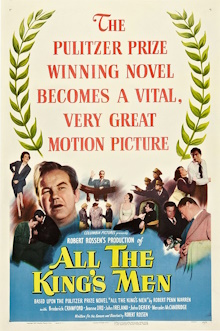A US election year in which Donald Trump stands a decent chance of returning to power is the perfect time to watch this political epic. I knew going in that this film won critical acclaim upon its release but it still exceeded my expectations and I wondered why it isn’t better known. I suppose it’s because it isn’t outstanding in any single aspect, with no stellar performances and no innovative visuals. It simply is a solid and honestly told political story. I am especially astounded that it manages to say so much and cover so much ground with a running time of less than two hours!
Jack Burden is a reporter but doesn’t do it for the money as his family is rich. He is assigned to cover Willie Stark, a barely literate yokel who is running for county treasurer. Won over by his honesty and earnestness in crusading against corruption, Burden writes a flattering article on him but he doesn’t win. Afterwards Stark earns a law degree and the staircase in a school collapses, killing many children. Stark surges in popularity and governor’s political team drafts him as a spoiler candidate to split the race. Once again, Burden covers his campaign and grows close to him, while Sadie Burke is sent to manage him. Stark does poorly at first but when Burden tells him that he is being manipulated, his speeches become more fiery. He loses again but this time claims that he knows how to win. Burden joins his campaign and even Sadie switches to support him for real. Meanwhile Burden has put off marriage with his girlfriend Anne Stanton whose grandfather was once governor. She is completely enamored with Stark when he next runs for governor again. Her family allies with him when her uncle, the respectable Judge Stanton, is offered the post of State Attorney General, even though Stark starts making deals with those he once castigated to get funding.
This is nothing less than the complete story of a politician rising from obscurity to the position of state governor, as seen through the eyes of a reporter who later turns into his opposition researcher to find dirt on his enemies. It covers it all, how Stark leverages his humble background story to gain grassroots support from rural areas, how his crusade against corruption coincides with a tragedy that is fortuitously timed for him, and how popularity alone isn’t enough without a well-organized and properly financed campaign. It also illustrates the powerful momentum effect of being a winner. As Stark’s popularity, money and influence increase, those who are close to him are able to see for themselves how he has become the embodiment of political corruption he used to condemn, yet he seems too powerful to stop. Even those who mean well are tempted to make a deal with him to achieve the things they want, to get a hospital built for example, in exchange for leaving him in power. Stark’s wife and his son become props in his campaign while behind the scenes, Stark becomes a philanderer and his charisma and power make attractive to many women.
This is such a cynical take on a populist politician that it’s hard to believe it came out in the 1940s. It even has Stark commit the cardinal sin of stealing Burden’s girl. The emasculated Burden still works for Stark to the end even as Anne proclaims that she has never met anyone as powerful and compelling as Stark. I do note that one element is absent from this film: Stark never invokes religion even though a US politician certainly must do so to have any chance of winning the people over. I guess that would have been a step too far. There’s the fact that the film offers no satisfying answer on how a democratic society can deal with a creature like Willie Stark. Its ending is a shortcut and not a legitimate answer at all so watching this only makes me more despairing of another Trump win at the end of the year.
I loved this film because it accords well with my interests and I am something of a political junkie. Even so, I can acknowledge that it doesn’t deserve to be hailed as a masterpiece. One critic called it a work of pictorial journalism which sounds about right. There’s too little self-reflection in it so it’s hard to tell what’s going on inside the head of someone like Willie Stark or the people who work for him like Burden. It’s also too straightforward and plain in its presentation to be artistically outstanding. It’s more educational than moving in other words but I’d recommend it all the same.
